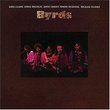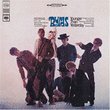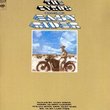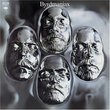| All Artists: Byrds Title: Farther Along (Exp) Members Wishing: 8 Total Copies: 0 Label: Sony Original Release Date: 1/1/1972 Re-Release Date: 2/22/2000 Album Type: Extra tracks, Original recording reissued Genres: Country, Pop, Rock, Classic Rock Styles: Folk Rock, Country Rock Number of Discs: 1 SwapaCD Credits: 1 UPC: 074646584927 |
Search - Byrds :: Farther Along (Exp)
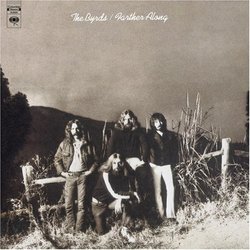 | Byrds Farther Along (Exp) Genres: Country, Pop, Rock, Classic Rock
Farther Along was one of the last albums from the group who soared to worldwide fame in 1965 on the wings of "Mr. Tambourine Man." Although overshadowed on its initial release in 1972 by the frenzy of anticipation surround... more » |
Larger Image |
CD DetailsSynopsis
Amazon.com Farther Along was one of the last albums from the group who soared to worldwide fame in 1965 on the wings of "Mr. Tambourine Man." Although overshadowed on its initial release in 1972 by the frenzy of anticipation surrounding a forthcoming reunion album featuring the original quintet, Farther Along proved to be the better album. On it are indications of just what made the Byrds' marriage of space-rock, country music, and pop such a special hybrid. Clarence White's title track and the poignant "Bugler" display the band's strengths admirably. This lavishly expanded reissue is augmented by three previously unreleased tracks--"Driving Wheel," "Born to Rock and Roll," "Bag Full of Money"--that bridge the gap between the end of the Byrds and the beginning of Roger McGuinn's solo career. --Patrick Humphries Similar CDs
|
CD ReviewsA living eulogy for Clarence White running_man | Chesterfield Twp., MI | 11/05/2006 (4 out of 5 stars) "Never intended as a "closer", 1971's 'Farther Along' represents the last call for the second coming of The Byrds, which unlike the first coming would never demand an encore, primarily due to the death of consumate lead guitarist and sometimes lead vocalist Clarence White. The album is particularly significant as the final major work of White, and furthermore contains the title track, arranged by White, which was performed at his funeral after being plowed down by a drunk driver in 1973. While many people herald the disc with accolades such as "warm", "intimate", and "noble", the truth is that the songs and the production were hurried. The album didn't come close to cracking the Top 100, certainly because The Byrds country-rock stylings were being overwhelmed by a tidal wave of heavy metal, glam-rock, and the commercialization of rock itself. Add to this a dearth of tracks by the band's heart and soul, Roger McGuinn (he only contributes the meaty opener, consciously composed as an opener, and one co-write), and the timing for the truncation of the band become apparent. It is instructive that the bonus tracks on the disc, which were recorded as preliminary tracks for a follow-up to 'Farther Along', add serious appeal to this package. All are McGuinn compositions, and the churning 'Lost My Drivin' Wheel' may be the most entertaining and catchy song in the lot. 'Born To Rock and Roll', a good song which unfortunately doesn't live up to it's billing, fares better here than it would on McGuinn's third solo disc, and 'Bag Full of Money', written with Jacques Levy, easily the longest track at nearly six minutes, completes a compelling trilogy. The high points of the original album as released on vinyl include McGuinn's gritty ode to his third wife, 'Tiffany Queen', the gospel influenced 'Farther Along', and another tear-jerker for dog lovers (building on 'Old Blue' from 'The Notorious Byrd Brother's'), 'Bugler', which Clarence White also took on his back to insure that his own lead vocal and the overall production would be done right. Other interesting tracks include 'America's Great National Pastime' (which comically equates "playing ball" with more dubious pastimes such as "cutting grass and grabbing a_ _"), which fell on it's face as the sole single release from the disc, and a sweet cover of the Fiesta's 'So Fine', resurrected by White. 'B.B. Class Road' is an ode to roadies, written by Gram Parsons and roadie extraordinaire "Dinky" Dawson, curious due to its rowdy and raunchy feel. 'Antique Sandy' and 'Precious Kate' are described as experiments in songwriting about relatively undistinguished women. 'Lazy Waters' comes across a bit ethereal due to it's Buddhist underpinnings, while 'Get Down Your Line' and 'Bristol Steam Convention Blues' (an instrumental closer) revisit the band's country-rock interests. As with the other Columbia remasterings of The Byrds catalog in 2000, the tracks come impressively packaged. David Fricke of Rolling Stone Magazine provides well-written and informative liner notes, and the original artwork from the album is reproduced and supplemented with period photographs. The history behind each individual song is given along with the composing credits and running times. There is even a hidden track, a bluegrass instrumental along with studio dialog, tacked onto the bonus tracks. If the album is ever reissued again, it would be interesting to see how this creation could in any way be expanded. 'Farther Along' is certainly comparable in quality to other works by The Byrds, such as 'Byrdmaniax' and 'Dr. Byrds and Mr. Hyde', but will never stand with the early releases by the first incarnation of the band, or their own 'Untitled/Unissued' triumph from the previous year. Nevertheless, the album is necessary to completists, and worthy of a listen by anyone interested in possessing a complete vision of the band's unquestioned mark on the history of rock music. In this particular case, the bonus tracks raise a three star effort to four." Two stars, generously given by a long-time Byrds fan Brad Averill | Eugene, Oregon United States | 01/17/2010 (2 out of 5 stars) "Let me offer here just a very brief review of Farther Along. I plan on doing a more thorough review of the last three Byrds albums (Untitled, Byrdmaniax and Farther Along) at another time. I will post it in each album's section on Amazon. Farther Along might or might not be the Byrds' artistic nadir, as one Amazon reviewer characterizes it. Dr. Byrds and Mr. Hyde gives it some pretty strong competition for that dubious distinction. Dr. Byrds, however, was a band rebuilding; this is a band falling apart. Even at their worst, the Byrds were outstanding musicians. Unfortunately, that distinction is not much in evidence here. The truth is that the arrangements are pedestrian. However, this album's greatest weakness is simply poor material. There is one and only one song that stands out and that is Bugler (spelled Buglar on my original release LP's label). Kind of reminds me Old Blue, the one redeeming track on Dr. Byrds and Mr. Hyde. Unmistakably, a dog love song, it tears at the heart strings of any boy whose best friend has been his dog. White's vocal is OK, but the arrangement and the material is strong enough to overcome any deficiency in the vocal. For a Byrds fan, this cut makes the album worth it (though not necessarily at the $35 and up prices I see today on Amazon). But the rest of the material is either forgettable (in the cases of McGuinn and Parsons) or you wish you could forget it (in the case of Battin). Farther Along was an inglorious end to arguably the best American band of the 60's and 70's. It is good that McGuinn saw that it was time to shut it down." Nice, Laid-Back Effort Statman | Little Rock, AR USA | 03/13/2010 (3 out of 5 stars) "The original Byrds were terrific singers and songwriters, with Gene Clark comparable to anyone else around, and Roger McGuinn, David Crosby, and Chris Hillman all more than competent. However, of the original band, only McGuinn and Hillman were genuinely excellent musicians. The Byrds early recordings often feature McGuinn overdubbing an extra guitar, or feature session virtuoso guitarist Clarence White to create the terrific studio sound that the early Byrds achieved. Unfortunately, the bands' live performances could be embarassingly uneven if their complex harmony vocals were slightly off the mark. By 1969, McGuinn was the only original member remaining in the band. Clarence White had been asked to join the band full time as a replacement for Gram Parsons, another fine singer and songwriter, who had himself replaced David Crosby. Gene Parsons had, indirectly, replaced Michael Clarke on drums, and John York had replaced Hillman on bass. York was replaced by Skip Battin in early 1970.
The lineup that recorded Farther Along, as well as the previous four albums, was a much stronger musical group than the original band, primarily due to White's fabulous guitar playing. Although a stronger group instrumentally, these Byrds were relatively mediocre singers and songwriters. McGuinn has always been a fine, but unprolific song composer, but has relied on others to write his lyrics. Battin wrote or cowrote several songs, but has never been considered an good songwriter. White and Parsons were more adept at performing bluegrass traditionals than writing originals. So the latter day Byrds were better musicians than the original Byrds, but much weaker as singers, and especially as songwriters. Farther Along is a laid back and enjoyable recording which benefits from Clarence White's finest studio performance with the Byrds, but suffers from inconsistent material. "Bugler", a touchingly beautiful folk cover, is White's finest performance as a vocalist and the best song on the album. White's rendition of "Farther Along" is also very good. "Bristol Steam Convention Blues" is a Parsons/White original bluegrass tune that sizzles, while White's guitar playing is prominent throughout most of the album. Parsons' "Get Down Your Line" and "BB Class Road" are pleasant country rockers. McGuinn's "Tiffany Queen" is a Chuck Berry style rocker which represents his best attempt at that style, while "Antique Sandy" is a pleasant folkish ballad. Skip Battin's contributions may be his best, despite representing some of the weaker songs on the album. "America's Favorite National Pasttime" is Battin's best song ever, a fairly funny, slightly insightful, but also goofy and un-Byrdslike, novelty tune. "Lazy Waters" is a nice cover which seems more personal than any of Battin's originals. "Precious Kate" is unobtrusively dull. The cover of the R&B standard, "So Fine", for which we may have White to blame, is a mistake. Overall, a very worthwhile album. Just sit back and listen to Clarence play! " |

 Track Listings (14) - Disc #1
Track Listings (14) - Disc #1